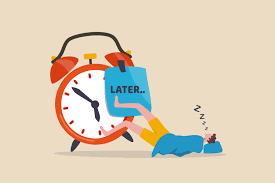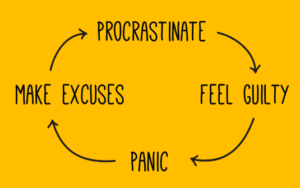Perils of Procrastination
Introduction
Welcome to the world of procrastination! Procrastination refers to delaying or postponing tasks that need to be done. It is an activity that we all are guilty of at some point in our lives. We know we have to finish that project, s tudy for that exam, or complete that presentation, but instead, we resort to wasting time scrolling through social media or binging on our favorite TV show. Procrastination is such a common practice because it gives us a break from the stress and pressure of our responsibilities and helps us avoid momentarily unpleasant tasks. However, the impact of procrastination on our lives can be catastrophic. It hampers our productivity and causes unnecessary stress and anxiety, which can have a domino effect on our mental and physical health, relationships, and even future opportunities. So, while procrastination might seem like a quick escape from our responsibilities, it’s time to realize that it’s a double-edged sword. It’s time to bid farewell to this enemy and learn how to tackle it head-on. So, let’s dive into some reasons why we resort to procrastination and ways to overcome it.
tudy for that exam, or complete that presentation, but instead, we resort to wasting time scrolling through social media or binging on our favorite TV show. Procrastination is such a common practice because it gives us a break from the stress and pressure of our responsibilities and helps us avoid momentarily unpleasant tasks. However, the impact of procrastination on our lives can be catastrophic. It hampers our productivity and causes unnecessary stress and anxiety, which can have a domino effect on our mental and physical health, relationships, and even future opportunities. So, while procrastination might seem like a quick escape from our responsibilities, it’s time to realize that it’s a double-edged sword. It’s time to bid farewell to this enemy and learn how to tackle it head-on. So, let’s dive into some reasons why we resort to procrastination and ways to overcome it.
Reasons for Procrastination
Alright, let’s talk about the reasons why we procrastinate. Buckle up, folks, because we’re diving into the deep end of human psychology here.
-First up, we have the classic “lack of motivation.” We all know that feeling, right? When the mere thought of starting a task drains all the energy from our souls. It’s like trying to run through quicksand – not fun. But why does this happen? Well, sometimes we simply don’t find the task interesting or rewarding enough.
-Other times, we may feel overwhelmed or unsure about where to start. Whatever the reason, the end result is the same: we put it off until the last possible minute.
-Next, we have the “fear of failure.” Let’s be honest, folks, nobody likes to fail. It sucks. But sometimes our fear of failure can hold us back from even trying in the first place. We worry that we won’t be good enough, that we’ll embarrass ourselves, or that we’ll let others down. This fear can be paralyzing, making it hard to even take the first step toward a task.
-Moving on, we have a “lack of time management skills.” Raise your hand if you’ve ever looked at your to-do list and felt like there aren’t enough hours in the day to get everything done. When we don’t know how to prioritize our tasks or manage our time effectively, it’s easy to become overwhelmed and let procrastination take over.
-Last but not least, we have “indecision and perfectionism.” Indecision can make us second-guess ourselves and constantly flip-flop between options, while perfectionism can make us hesitate to start anything until we’re certain we can do it perfectly. Both of these can be major roadblocks on the path to productivity.
So these are just a few of the reasons why we procrastinate. Of course, everyone’s reasons are different, and sometimes it’s a combination of multiple factors. But at the end of the day, what matters is finding ways to overcome these roadblocks and get stuff done. That’s what we’ll be talking about next.
Consequences of Procrastination
We all have things we would rather put off until later. Maybe it’s that big project at work, or perhaps it’s cleaning out the garage. Whatever it may be, procrastination is a common pitfall that many of us fall into at some point in our lives.

-One of the consequences of procrastination is stress and anxiety. When we put things off until the last minute, we often create unnecessary stress for ourselves. Our deadlines begin to loom over us like a dark cloud, causing us to feel overwhelmed and anxious.
-Another consequence is poor time management. When we procrastinate, we’re essentially wasting time that could be better spent on something productive. This not only leads to missed opportunities, but it also sets a bad precedent that can carry over into other areas of our lives. Speaking of missed opportunities, that’s another consequence of procrastination. When we wait until the last minute to get things done, there’s a good chance that we’ll miss out on opportunities that could have been beneficial for us. This could be anything from a job opportunity to a chance to showcase our talents to a wider audience.
-Finally, procrastination can also have a negative impact on our relationships. When we’re constantly putting things off, it can make us seem unreliable and untrustworthy to others. This can damage our relationships with friends, family, and colleagues alike. Overall, the consequences of procrastination are far-reaching and can have a significant impact on our lives. So, next time you find yourself reaching for the snooze button or putting off that important task until tomorrow, remember that the consequences of procrastination are not worth the temporary relief of avoiding the task at hand.
Conclusion
We’ve all heard the phrase “time is money”. It’s a cliché because it’s true. Wasting time means wasting opportunities and ultimately, money. That’s why it’s important to overcome procrastination and master time management and productivity. By learning to manage our time better, we can work more efficiently and accomplish more in less time, leading to more opportunities for growth and success. We can also reduce stress and anxiety, as we have more control over our schedules and can avoid those last-minute crises. Procrastination can be a difficult habit to break, but by setting priorities and goals, breaking down tasks into manageable steps, eliminating distractions, and practicing self-discipline, it can be overcome. It’s important to find an accountability and support system, whether it’s a coach or a mastermind group, to help keep us on track and motivated. So, let’s take the first step towards mastering time management and productivity and say goodbye to the perils of procrastination. It’s time to seize those opportunities and achieve our goals.
![]()
One Reply to “Perils of Procrastination”
Comments are closed.